Classic French madeleines, or madeleine cookies, are perfect in shell shape, density, and texture, and they have a delicious taste that can't be matched. Grab the best madeleine recipe and learn all the tips and tricks on how to make homemade madeleines with a hump on top.
This post is a part of my Madeleine series in tribute to this iconic French pastry and all that it means - from fascinating madeleine history, choosing the right ingredients and madeleine pan, all the secrets of authentic madeleine hump, and storage suggestions - you name it!

What are French madeleines?
French madeleines are authentic French shell-shaped cakes, sometimes called madeleine cookies, perfect for breakfast, afternoon snacks, and a lunchbox idea.
French madeleine recipe
This madeleine recipe is one of those on the Internet that guarantees perfectly shaped authentic madeleines with a signature hump on top. It's foolproof, tested, and re-tested by me in my home kitchen and numerous readers.
I am putting together all the tips and advice to guide you. So take notes of essential steps before you get started and enjoy.
I would highly recommend downloading my troubleshooting guide, where I answer all the questions regarding the madeleine pastry.
Ingredients
For ingredients and detailed instructions, refer to the recipe card below.
- Large eggs at room temperature
- Granulated sugar
- Unsalted butter: I always use European or European-style butter with 82% fat content.
- Flour: Use all-purpose flour or French T55 flour.
- Honey: I use chestnut honey, but you can replace it with your favorite honey, golden syrup, or maple syrup. You can use liquid or crystallized honey; its consistency doesn't matter.
- Baking powder, fresh and aluminum-free. It's responsible for the madeleine hump.
- Vanilla bean: Use scraped seeds or replace them with ½ to 1 teaspoon of pure vanilla extract or orange blossom water.
- Lemon zest: Use organic lemon to make fresh zest or replace it with orange zest You can omit this ingredient if desired.
How to make madeleines step-by-step
Step 1. Place large eggs, granulated sugar, honey, and scraped seeds of half of the vanilla bean in a large bowl and beat with a hand whisk for 1-2 minutes.
Step 2. Sift flour and baking powder in a separate bowl. Add the dry ingredients to the egg mixture and combine with a whisk or rubber spatula.
Step 3. Add the melted butter (it must be cooled to 120°F (50 °C) and whisk again. Add lemon zest and gently mix.
Step 4. Cover the batter with a piece of plastic wrap in contact and refrigerate overnight, or even better, for 24 hours. The plastic film must touch the surface of the batter and not only cover the bowl.
Step 5. Preheat the oven to 425°F (220°C). Using a pastry brush, butter the cavities of a metal madeleine pan. Then dust it with flour and tap any excess flour; there is no need to grease a silicone mold. Using a piping bag or a spoon, fill the cavities up to ¾.
Step 5. Bake at 425°F (220°C) for 3 minutes. Then switch off the oven for 8 to 10 minutes. The madeleines will get that famous bump on top. Next, turn the oven to 320°F (160°C) for the other 3 to 4 minutes.
Step 5. Remove madeleines from the oven and cool in the mold for 5 minutes. Take them out one by one, simply pushing each cavity from the bottom. Place cakes on the side, still in the mold, so that they completely cool (do not use a wire rack to avoid its traces on the surface of madeleines).

Expert Tips
- Do not overheat butter while melting. To avoid this, turn off the heat when half of the butter is melted and mix the butter off the heat.
- Preheat the oven to 425°F (220°C) and even let it heat for 10 minutes. A well-prepared hot oven is essential to get the bump of madeleines.
- Leave the filled mold in the fridge while preheating/heating the oven.
- Respect the temperature regimen to make perfect madeleines. The ideal temperature formula is 3 + 8 + 4, where 3 is 3 minutes of baking at 425°F/ (220°C), "8" is 8 minutes with the oven switched off, and "4" is 4 minutes of baking at 320°F (160°C). You might need to test your oven and adjust this formula, for example, as 3 + 7 + 3 or something different. Adjusting the last baking minutes is essential to prevent madeleines from burning.
- Bake madeleines on a baking rack in the middle of the oven and not on a baking sheet.
- Bake one batch of madeleines (one mold) at a time. After each batch, clean the mold, then bake the rest. Keep the rest of the batter in the fridge between batches.
Recipe variations
Traditional madeleines are lemon madeleines flavored with lemon, but you can customize them endlessly.
- Add poppy seeds to make lemon poppy seed madeleines.
- Spice madeleines with spices blend to make Gingerbread madeleines.
- Dip madeleines in melted dark or white chocolate.
- Create flavored madeleines with a twist on a classic.
- Experiment with different molds, such as a spherical scallop madeleine mold or a heart-shaped pan from CHEFMADE.
- Skip all of those pesky steps and make a madeleine cake in no time.
How to store madeleines
Store madeleines in an airtight container (preferably glass) for a couple of days, up to four days. The baked madeleines don't need to be refrigerated; they can be stored at room temperature
Freeze madeleines for up to three months, but they may lose their taste a bit. To thaw, bring them to room temperature for one to two hours. Read more about how to store madeleines.
How to serve madeleines
Serve madeleines immediately (straight from the oven). The French enjoy them with a cup of Earl Gray tea, a black tea flavored with bergamot.
To appreciate their taste and release the flavor, madeleines have to be dipped in tea, the same way Marcel Proust enjoyed little cakes. But, unfortunately, coffee isn't the same.
Recipe FAQ
There is much debate over whether madeleines are cookies or cakes. Although many think they are teacake cookies (or sponge cake-like French madeleine cookies), they are actually mini cakes. But even in France, where the madeleines originated, many chefs still call them madeleine cookies.
Refrigerate the madeleine batter covered in contact with plastic film or a pastry bag for up to 2 days. Don't freeze it.
Yes, you can try a silicone muffin pan that works as a madeleine pan substitute. You can even line the wells with cupcake liners. You can also bake these little cakes in small rectangular or even round molds.
Love madeleines? Try these next!
HUNGRY FOR MORE? Subscribe to my newsletter and follow me on Facebook, Pinterest, and Instagram for my latest updates.
PrintRecipe card
Classic French Madeleines (Madeleine Cookies)
This guide is the best madeleine recipe for homemade French madeleines. They are perfect in shape, density, and texture, with a delicious taste that can't be matched.
- Total Time: 1 hour (plus chilling time)
- Yield: 36 1x
- Category: Small cakes
- Method: Baking
- Cuisine: French
Ingredients
- 250 g eggs (5 eggs), room temperature
- 1 ¼ cups (250 g) granulated sugar
- 8.8 oz (250 g) unsalted butter, melted and cooled
- 2 cups (250 g) all-purpose flour
- 1 ⅓ tsp (12 g) chestnut honey
- ½ vanilla bean
- 2 tsp (10 g) baking powder
- ½ lemon, zest
Instructions
- To make the batter, place eggs, granulated sugar, honey, and scraped seeds of half of the vanilla bean in a large bowl and beat with a hand whisk. Sift flour and baking powder with a flour sifter in a separate bowl. Add dry ingredients to the egg mixture and combine with a whisk or a rubber spatula. Add melted butter (it has to be cooled to 120°F (50°C) and whisk again. Zest half of a lemon with a zester grater, add to the butter mixture, and mix.
- Cover the batter with plastic film on contact and refrigerate overnight, or even better, for 24 hours. The plastic wrap must touch the surface of the batter and not only cover the bowl.
- Preheat the oven to 425°F (220°C). Using a pastry brush, butter the cavities of the metal madeleine pan, dust it with flour, and tap any excess flour; there is no need to grease a silicone mold. Using a pastry bag, fill the cavities up to ¾.
- Bake at 425°F (220°C) for 3 minutes. Then, switch off the oven for 8 to 10 minutes. The madeleines will get that famous bump on top. Turn the oven to 320°F (160°C) for the other 3 to 4 minutes.
- Remove the madeleines from the oven and cool in the mold for 5 minutes. Then, take them out one by one, simply pushing each cavity from the bottom. Place madeleines on the side, still in the mold, so that they completely cool (do not use a wire rack to avoid its traces on the surface of the madeleines).
Notes
- Do not overheat butter while melting. To avoid this, turn off the heat when half of the butter is melted and mix the butter off the heat.
- Preheat the oven to 425°F (220°C) and even let it heat for 10 minutes. A well-prepared hot oven is essential to get the bump of madeleines.
- Leave the filled mold in the fridge while preheating/heating the oven.
- Respect the temperature regimen while baking. The ideal temperature formula is 3 + 8 + 4, where 3 is 3 minutes of baking at 425°F (220°C), "8" is 8 minutes with the oven switched off, and "4" is 4 minutes of baking at 320°F/160 °C. You might need to test your oven and adjust this formula, for example, 3 + 7 + 3 or something different. Adjusting the last baking minutes is essential to prevent madeleines from burning.
- Bake cakes on a baking rack in the middle of the oven and not on a baking sheet.
- Bake one batch of madeleines (one mold) at a time. After each batch, clean the mold, then bake the rest. Keep the rest of the batter in the fridge between batches.
Nutrition
- Serving Size: 1
- Calories: 112
- Sugar: 7.3 g
- Sodium: 27 mg
- Fat: 6.4 g
- Saturated Fat: 3.8 g
- Carbohydrates: 12.7 g
- Fiber: 0.2 g
- Protein: 1.7 g
- Cholesterol: 41 mg
The nutritional information has been calculated using an online recipe nutrition calculator such as Verywellfit.com and is intended for informational purposes only. These figures should be used as a general guideline and not be construed as a guarantee.
The recipe was adapted from http://www.niksya.ru. It was originally published in February 2018. The recipe has been revised to include improved content and photos.



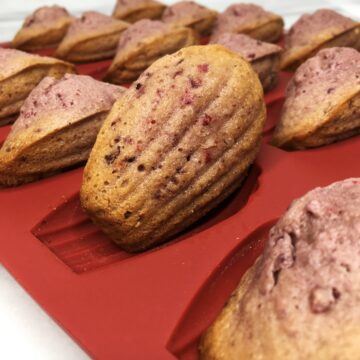
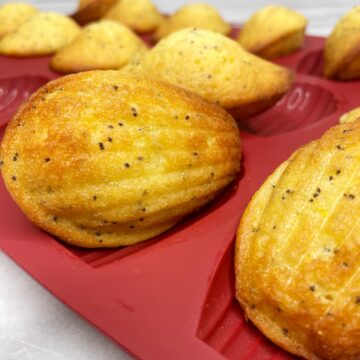
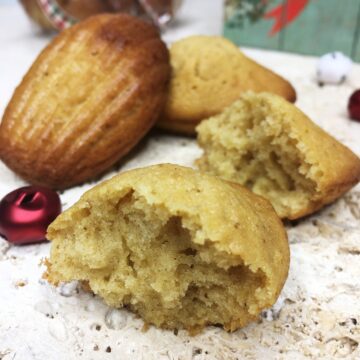
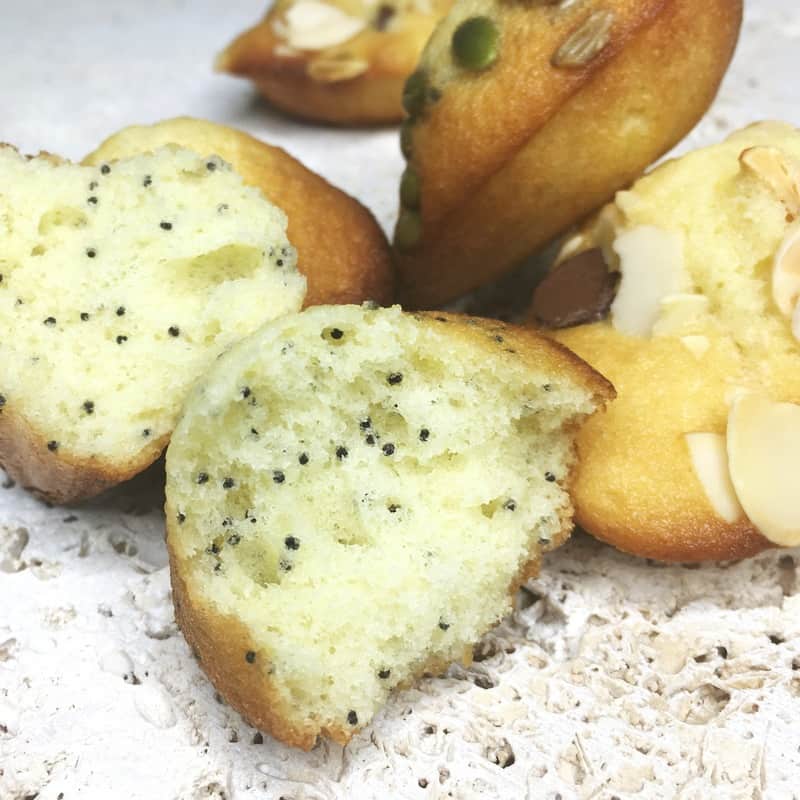

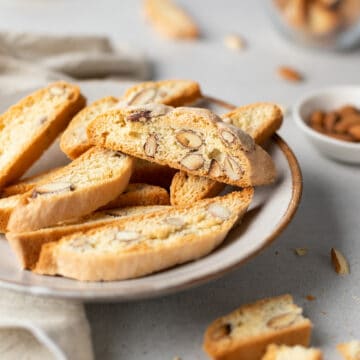
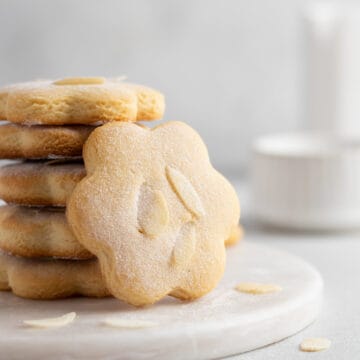
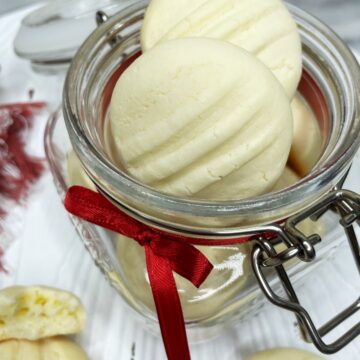

Lakshya says
Hi! I'd like to use a beurre noisette for the madeleines as I love its nutty flavor. Do you recommend this? What adjustments can I make to the recipe?
Irina says
Lakshya, thanks for your ineterst in the recipe. You will ok with using a beurre noisette. Make it first, then weigh to get the amount of butter in the recipe. No other adjustments are needed. Happy baking!
Mirlene says
I've never made madeleines at home. Definitely, the recipe for me to play with over the weekend!
Irina says
It will surely be a fun and delicious weekend, Mirlene! Thanks for visiting the recipe. Please, enjoy it. 🙂
Deanne says
These are just gorgeous and melt in your mouth delicious!
Irina says
Thank you very much, Deanne!
Jacqueline Meldrum says
I had a shop-bought one of these at the weekend, but these look so much nicer!
Irina says
You will love these homemade madeleines once you make them, Jacqueline! Please, enjoy the recipe.
Michelle says
I've been looking for a madeleine recipe for ages, especially with that pronounced hump! Bookmarked for when I get a madeleine pan!
Irina says
Perfect, Michelle! Please, let me know if you have any questions. Thanks for stopping by. 🙂
Pam says
Wow! What a lot of great tips. I will definitely have this blog post open on my laptop when I make these for the first time.
Irina says
Thank you, Pam! Please, let me know once you make the recipe. 🙂
Julie says
Hi! Thanks for sharing this recipe. I just noticed in your article, you mentioned milk, but in your recipe and the list of ingredients, milk is not on the list. Can you please clarify? And if I were to make half of the recipe, should I add 2 or 3 eggs? Thank you😊
Irina says
Hi, Julie. Thanks for your interest in the recipe. Yes, I wrote a comprehensive guide to French madeleines, but the recipe itself does not include milk. Although, many French chefs add it to their recipes. Please, follow the recipe as provided, and you will succeed! To make half of the recipe, you will need 2 1/2 large eggs. The best to measure is to use a kitchen scale. Otherwise, please, beat the third egg, and use its half. Please, let me know if you have more questions. Happy baking!!!
Rannie says
Thanks for the amazing recipe and many tips. I’ve baked a few times already, and the results have been fabulous. (I followed your recipe to a T) You mentioned that following the oven temperatures are crucial to have the famous bumps. However, I just wonder if it would be still working on baking them at one steady temperature as other recipes suggested. Some of them just bake them in 180 C, and the bumps are still made. What do you think? I just have to ask. Thank you again.
Irina says
Hello Rannie, I am so happy to hear that the recipe worked for you! To tell the truth, I have never tried to bake madeleines at a steady temperature and get the famous bump. The thermal shock is responsible for the development of that pretty bump. Maybe it is worth experimenting with. 🙂 I have just found a madeleine recipe by French chef Cyril Lignac where he bakes madeleines at a steady 175C. Please, have a look at the madeleines' bump. The one interesting thing I learned that the height and the form of the bump are different using different baking regimens. For example, I tried to make madeleines using the madeleine recipe on my blog but used the baking regimen by Philippe Contichini. The bump was different! It was the highest madeleine I ever made. So, now it is your choice what kind of madeleine bump to create. 🙂 I will be curious to read if you tried other baking regimens. Happy baking, and enjoy it!
Cha says
Hello!! Thank you so much for the recipe. I will try to bake it this weekend. Instead of lemon zest, can I use cocoa powder? How about the amount of cocoa powder? Because my family doesn't really like lemon.
Irina says
Hello Cha! Thanks for your interest in the recipe! First, you can easily omit lemon zest. That's it! If you want to make a chocolate version of madeleines, replace 4 1/2 tablespoons (35 g) of all-purpose flour with cocoa powder. It means you will use 35 g cocoa powder and 215 g flour (in grams). Please, let me know how your baking went. Happy baking!!!
Lubna says
Wow....these look perfect and absolutely delicious. Thank you for sharing such a wonderful and detailed post.
Irina says
You are very welcome, Lubna! Please, enjoy the recipe. 🙂
Anjali says
I've always felt intimidated to make the perfect madeleines at home, but your recipe has inspired me to give it a try!! These look so soft and delicious, and your tips for baking them are super helpful!
Irina says
I am glad you like the recipe, Anjali! The next step is to make madeleienes. 🙂 Happy baking!
Amanda Wren-Grimwood says
I love madeleines, and there are so many great tips here to get the hump right! Definitely trying this method.
Irina says
It sounds great, Amanda! Happy baking, and enjoy it!
Dannii says
I have always wanted to make these, and this has given me the nudge, as they look pretty simple.
Irina says
Oh, my post makes sense now. 🙂 I hope you will make madeleines, Dannii! Thanks for stopping by.
Julia says
The best madeleines I have ever tried!
Irina says
Thanks a lot, Julia!
Katya says
I am about to make these, and the recipe looks great; thank you for all the extra information - it really helps to understand the process!
My question is - do you use unsalted butter? I don't see any salt in the list of ingredients.
Thank you!
Irina says
Hi Katya, thanks for your interest in the recipe. Yes, please, use unslated butter. Happy baking, and enjoy it! 🙂
Ili Kamardin says
Hi, I'm Ili from Malaysia. I've just baked madeleines using your recipe; it turned out well. Thank you so much for this recipe. I love it so much. 🥰
Irina says
Thank you, Ili, for making the madeleine recipe. I am happy to hear that you loved it!
Maria says
Hello, is it possible to replace honey with maple syrup? Thank you very much for your detailed post. I've never had success with beautiful bumps baked in a silicone mold, but you've inspired me to try again.
Irina says
Hello Maria, thanks for your interest in the madeleine recipe. I have never replaced honey with maple syrup in this recipe, but I think it should work. So yes, theoretically, it should be fine. Please, get here back to leave your feedback. Thanks, and happy baking!
Maria says
Hello Irina, I didn't switch out the honey, and I'm pleased to report a successful bake with a high hump 🙂 It was so yummy that I went on to bake 5 different flavors for my family, and it was a hit! Thank you once again! Now I'm addicted to baking madeleines :)))
Irina says
Thanks, Maria! I am so happy to hear that!!! I also have a post for gingerbread madeleines. They are my favorites! 🙂
PT says
Can I just use honey instead of sugar for this recipe? How much honey should I use?
Irina says
Thanks for interest in the recipe. Sugar is a sweetener, but it is also responsible for baked goods' texture. So, this recipe was created to build the texture and shape of madeleines and make them delicious. I recommend sticking with the recipe as it is with the first attempt, then experimenting. I haven't tried to replace sugar with honey in the recipe personally.
Amy says
So, even when using the "shell" or scalloped mold, do you still want the bumps? Also, do you dust w powdered/confectioners sugar afterward? And, if so, and if making in advance - would you shake that on just before serving? Thank you!
Irina says
Hi Amy, thanks for your interest in the recipe. Yes, you should obtain the bump baking in any mold. As for dusting with icing sugar, it is not necessary, but you can do this before serving (after the madeleines are cooled down). Please, let me know if you have more questions.
Melody says
Hi, Thank you for the great recipe; I just want to know if I can replace the all-purpose flour with cake flour?
Irina says
Hi Melody, thanks for your interest in the recipe. I have never seen any French chef's madeleine recipe using cake flour, to tell the truth. I am not sure if such flour exists in France, though. As for me, I always use all-purpose flour to make madeleines. So I would suggest following the recipe as it is to get the same result as me. Then you will be able to experiment in madeleine baking. 🙂 If you ever try to making madeleines with cake flor, please, let me know how it went. Thanks!
Ginger Kiyomoto says
I just made these over the last two days as a baking project with a 2.5 & 5 year old. I browned the butter for them (too long of a process 😂). But they were able to mix the recipe (we left out zest), grease & flour the madeleine mold & even fill up a pastry bag (little help there). They had fun squeezing the batter out of the pastry bag too (I held, they squeezed). They do not take long to bake, so they saw them puff up in amazement! The best part is they thought they were super yummy!
Irina says
What a fun baking project you had with kids, Ginger! I am happy to hear that you all enjoyed making madeleiens! So sweet... Thanks for letting me know. 🙂
Erika says
Hi. I do not have vanilla bean . How much extract can I use ?
Irina says
Hi Erika, replace 1 vanilla bean with 1 teaspoon of vanilla extract or 1 teaspoon of vanilla bean paste. Happy baking!
Cassie meovon says
Hi, thank you for the detailed explanation! I was very satisfied reading it because you also included the reason why it's needed! But I was wondering, what exactly is the reason that the recipe needs honey as an ingredient? Is it the replacement for milk? If it is, can I substitute it with any other ingredients? Sorry for asking many questions, I love your post 😀 Thanks!
Irina says
Hello Cassie, since I adapted the recipe from the French pastry school, it is hard to answer why honey is included as an ingredient. I do not think that it replaces milk, though. I would replace it with maple syrup or golden syrup. I have never tested this way, but it should work. Please, let m know once you make madeleines. Happy baking!
Clarissa says
Hi Irina, how long did you whisk the egg and sugar? And when the batter finishes so, I don't need to cover the top of the bowl? Only the bottom? Thanks.
Irina says
Hi Clarissa, Thanks for your interest in the recipe. NO, you do not need to whisk the eggs with sugar until the mixture is whitish. Just whisk the mixture for 1 to 2 minutes with a hand whisk. And you need to cover the top of the bowl with plastic film, but the film has to touch the batter. It is called "to cover with plastic in contact." Let me know, please, if you have more questions!
Linh says
Hello, Firstly, thank you for the recipe and all the tips. I followed your recipe to the T but didn't achieve the hump, and it was rather dark and dry. I did not use a silicone pan but instead the non-stick metal pan. Just wondering whether the temperature differs for the metal pan?
Irina says
Hello Linh, I am sorry to hear that you didn't succeed in getting that famous bump. First, the baking regimen should be the same even you use a metal madeleine pan, but it has be adjusted to your oven (I mean the time to keep the oven heated, switched off, and the time to turn on again). It usually the play of 1-2 minutes. To achieve the bump, you should chill the dough for at least 2 hours, better overnight. I hope you didn't skip that step. Once you feel the pan with the batter, you should bake right away or keep the pan in the fridge. You should also preheat the oven, and it is even better to keep it heated for another 10 to 15 minutes. Then you should bring the pan with the batter to bake. Please, re-read the recipe post again and try to analyze at what step you made a mistake. Please, write me back to figure it out together. I am here to help!!!
Aeran says
Hi, just wondering if I could use cake flour instead of all purple flour? What do you think?
Irina says
Hi, Aeran thanks for your interest in the recipe. I understand that it makes sense to use cake flour to make these little cakes, but the recipe doesn't call for any starch that is part of the cake flour. So, I would recommend making the recipe using all-purpose flour, at least the first time. Then, once you succeed in madeleine baking, you will surely get the confidence to experiment. Happy baking!!!
Kristin says
This madeleines recipe is perfection! I’ve tried others, and this is by far the best. They taste and look gorgeous. Thank you!
Irina says
Thank you so much for making the recipe, Kristin! I am happy to hear that the recipe worked for you. 🙂
Natalie says
Best ever instruction, success, after all, thank you!
Irina says
Thank you very much, Natalie! I'm happy to hear that!!!
Hsu Lin Boyd says
Hi, I am going to try my hand at these. Unfortunately, the people I am making them for have a lot of health issues. So I have to sub the butter with walnut oil and significantly cut down on the amount of sugar. Usually, in cake making, one would usually mix all liquid ingredients together, the beaten egg, sugar mixture, and melted butter, then the flour last…. Why is it not so in this case? Sorry for the idiot question, but I'm just curious…
Irina says
Hello, thank you for your interest in the recipe. The sequence of ingredients is essential in baking, especially in French pastry making. The method of mixing ingredients (liquid plus dry ones) is a standard method of making muffins. French madeleines are different, but there is no universal order to incorporate ingredients while making a madeleine batter. For example, French chef Gilles Marchal mixes all the dry ingredients first, then adds the eggs, and finishes with melted, cooled butter. Another pastry chef Camille Lesecq combines first eggs, sugar, honey, and milk. Then, he adds "the brown butter, and finally, the flour sifted with baking powder and the liquid and powdered vanilla." The madeleine recipe on the blog is adapted from the school of another great French chef, Alaine Ducasse. I wouldn't suggest changing the order of ingredients for the best baking results. And I understand that you are trying to adapt the recipe. Unfortunately, I cannot guarantee the right texture of your madeleines, but I am curious if it works. It would be beneficial for my readers too. Please, share your baking results after you make madeleines! Thanks, and happy baking!
Basema Rehman says
It's a definitely fantastic recipe. It was really easy to do and worth making the batter one night before. These are now my brother's favorites!!
Irina says
Thanks for coming back to leave a comment, Basema! I am happy that you succeeded with the recipe.
CF says
This ended up so good! My hubby and kids liked them. I had the hump in all batches, but the first batch turned out a bit burnt. Got the hang of things after that with the temp. Thanks for such an easy recipe!
Irina says
Thanks for getting back to comment. I am so happy to hear that you loved the recipe and succeeded with the bum!! 🙂 Please, stay tuned for more recipes!
Ann says
I just made my first batch ever using this recipe. The madeleines came out perfect. Read the content first to get the best chance for success. They are so light and delicious. Thank you!
Irina says
You are very welcome, Ann! And I am so happy to hear that you succeeded!!
Allis says
This is the best madeleine recipe I've made. Tastes authentic, and I got the most gorgeous hump. 🙂 If I wanted to use less sugar can I sub honey or maple syrup instead? I read that 1 cup to .75 cups honey is an appropriate sub for sugar since honey has more water content, but I was just wondering if you thought this would be an appropriate substitute. Thank you!!
Irina says
Hello Allis, thank you for making the recipe! And I am so happy that you succeed with that famous bump! As for replacing sugar with honey, everything should be tested. I have not done this replacement yet. If you try it, please, let me know. Thanks! BTW, I created a page dedicated to madeleines: https://www.bakinglikeachef.com/madeleines/. Please, enjoy reading it. 🙂
Donna says
Anxious to try it - looks pretty straightforward! Do you have a chocolate Madeline recipe?
Irina says
Hello Donna, thank you for your interest in the madeleine recipe. Oh, I should have a chocolate madeleine recipe, but I have not made it yet. It is on my list now! Thanks! BTW, I have a whole page devoted to madeleines: https://www.bakinglikeachef.com/madeleines/. Happy baking!!!
Rita Wallace says
Hi dear.
Your recipe calls for 5 eggs (250 gms). Is it with the shell or without the shell??.
Here in Singapore, the weight of each large egg is around 60 gms with a shell...so how many eggs do you think I need to use for 1 batch of madeleines for this recipe???
Thanks
Irina says
Hi Rita, thank you for your interest in the recipe. 5 large eggs indicated in the recipe are without shells. On average, one large egg with a shell weighs 57 g. So, you should use 5 large eggs. If you have a kitchen scale, it will be more precise. 🙂 Happy baking!!
Nico says
Wow! Best recipe ever, and I've finally got the bump after trying so many recipes! I don't know how you've come up with the 3-8-3 baking method, but this is a revolution - and it makes complete sense in a weird way! And yes, the madeleines taste great too, double bonus! Thank you so much, and I can't wait to try more recipes from this website.
Irina says
Hello Nico, thank you very much for making the recipe and for your comment. Please, stay tuned for new madeleine recipes and more!!
Meg says
I was so nervous making these, but they turned out amazing! A big hit with the family. Thanks
Irina says
Hello Meg, I am so happy to hear that you succeeded with the recipe!! Thanks for your comment. 🙂
Min says
First try, and the signature hump was there. You made me look like a pro. Thank you for sharing the detailed recipe!
Irina says
Hello Min, You made my day!! I am so happy to hear! Thanks for coming back to let me know. 🙂
Sheri says
Can you advise on how long to bake mini madeleine? I'm making these for a tea party and need a lot of them. So I figure the minis would be a better choice.
Irina says
Hello Sheri, I haven't made mini madeleines myself carrying this idea for a long time. So, I cannot suggest the exact baking formula. But I did some research and it seems this baking regimen should work: heat the oven to 230 C. Bring the madeleines to the oven, lower the temperature to 210 C and bake for 7 minutes. I hope it will work. Please, let me know!
Pam says
Can the honey be replaced with something else? Not a fan of honey. I am looking forward to making these as I'm bringing them to a wedding to put on the dessert table. Your information was wonderful. Thank you
Irina says
Hello Pam, thank you for your interest in the recipe and comment. Please, replace honey with maple syrup or golden syrup. Happy baking!!
Leslie says
Should I use all-purpose flour, or would you recommend cake flour for a lighter cookie? Leslie
Irina says
Hello Leslie. The recipe is created for all-purpose flour. Happy baking, and please, let me know how it went!
Denver Gregg says
I'm very experienced at cooking but new to baking. this came out great (even with the accident that I only had powdered sugar on hand). However, it made too much for me. I will probably cut to 60% of everything next time.
Irina says
Hello Denver, thank you for making the recipe. I always suggest that readers make the recipe as it is and then experiment regarding ingredient swaps. Please, let me know how your next baking goes. 🙂
Lf says
Can I use this recipe with the same baking instructions as Madeleine without mold?
Irina says
Yes, sure!
Nancy says
Are you using salted butter or unsalted? Also, what's the best honey to substitute if not using chestnut honey? Thank you!
Irina says
Hello Nancy, thank you for your interest in the recipe. Please, use unsalted butter and any type of honey you have on hand. Happy baking!!
Eva Brum says
Excellent! Excellent! This was the first time I made Madeleines, and I had complete success. Thank you so much.
Sean says
Hi Irina, I recently found out about madeleines on a trip to France last month and life hasn't been the same since. Since returning home, I've been unable to find a single good-looking madeleine that won't end me, and its beginning to tear open an ever-growing hole in my soul. The main reason behind this absolute travesty is my allergy to what seems to be the key ingredient in these subjectively boat-shaped cakes; butter. After coming across such a wonderfully written and explained article on how to bake them on my own however, I have to ask- is it possible to substitute real butter for something like margarine?
Irina says
Hello Sean, sure thing, you can replace butter with margarine, but you will miss that butter flavor and taste. I haven't tried this substitution, but it has to work! Please, let me know then. Happy baking!
Sean says
Thanks so much, I'm planning to try it next weekend hopefully they turn out alright!
Mariana says
Hi, Would you happen to know if the batter can sit for 48hrs in the fridge if baking isn't possible within 24hrs? Thanks!
Irina says
Hi Mariana, I haven't tried to refrigerate the madeleine batter longer than 24 hour, but according to French bloggers, "the madeleine dough can be kept covered in film without any problem for 2 to 3 days in the refrigerator".
Fiat Lux says
#5 instruction for Classic French Madeleines is confusing; please clarify:
5. Remove madeleines from the oven and cool in the mold for 5 minutes. Then, >>take them out one by one, simply pushing each cavity from the bottom. Next, place cakes on the side, still in the mold,<< so that they completely cool (do not use a wire rack to avoid its traces on the surface of madeleines). Dust madeleines with confectioners' sugar if desired.
Irina says
Hello Fiat, To release the madeleines from the mold, gently push the cavities from the bottom after they have cooled for 5 minutes. If using a silicone mold, this step is essential. Then, place each cake on its side to cool completely. Avoid placing the madeleines on a wire rack to prevent any marks on their surface.
Mary Smiley says
Hi Irina, Please clarify for me. After you do your 8 minutes with the oven off, and then turn the oven to 320° do you have to wait until it actually reaches 320° before you start timing the other four minutes or I should start timing right away when you turn the oven back on?
Irina Totterman says
Hello Mary, you should start timing right away when you turn the oven back on!! Test the first batch, than adjust the baking formula with the second batch (every oven is different). Happy baking!
Maryann Plourde says
I have the smaller Madeline pans. Do I use the same temp times as in the recipe?
Irina Totterman says
Hello Maryann, Thank you for your interest in the recipe. Unfortunately, I haven't tested the recipe for a small madeleine pan. Theoretically, the baking time/formula has to be adjusted, but I need to test the recipe myself before suggesting it.